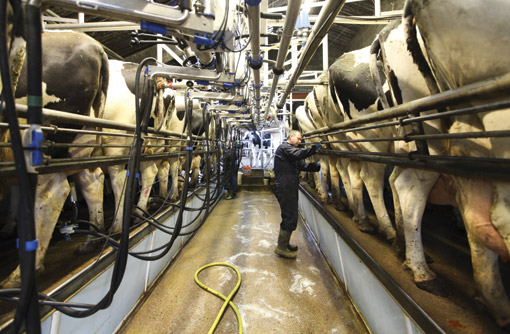Am I on the right milk contract for my business?

Changing milk buyer is a big decision and not one a dairy farmer will make on a regular basis, so getting it right is crucial, said The Dairy Group’s managing director Ian Powell.
“Farmers will be shopping around in a sense, because although the milk price has reached 30p/litre, for many it’s still barely meeting the cost of production,” he said.
“Cost of production is the highest it has ever been. Last year was probably the worst season in living memory and not surprisingly everyone’s costs are higher.”
However, switching contract for short-term gains won’t tackle high production costs, he warned.
The DairyCo Milkbench + report, published in January, stated the key driver to farm profitability is cost of production, not milk price.
“You have to address your costs – changing milk buyer for say an extra 1p/litre won’t really improve things or remove the fundamental issue [of high production costs],” he said.
“If what your milk buyer has paid is the same as another milk buyer, but they are offering an incentive, you need to ask is that enough to tempt you to move milk buyer.”
Mr Powell provided seven top tips for producers looking to change milk buyer.
1 Look at net milk price
Many farmers get hung up on individual contract clauses including transport charges or volume bonus but the key thing to consider is the net milk price you are likely to achieve from a contract, as every payment schedule is different.
2 Compare price using historic data
Look at what price you would have achieved for your milk in the past 12 months with different buyers. Compare like for like using exactly the same details used to determine your current milk price – for example, constituents, volume, cell count deductions and so on. DairyCo provides an historic milk price calculator where you can compare what different companies would have paid you for your milk in the past 12 months using annual milk production data.
3 Assess new contracts
Before changing to a new buyer, look at any recruitment incentives (for example, Muller Wiseman Dairies’ 1p/litre bonus for new producers, paid at the end of the first 12 months’ supply) and read the contract clauses carefully to ensure they fit with your milk production. This is especially important if you are considering a change in farming system from all-year round calving to autumn- or spring-block calving because seasonality payments and deductions will become more important to your business.
4 Find out your notice period
Many dairy companies have now signed up to the dairy voluntary code of practice (News, p24-25), which stipulates producers on discretionary pricing contracts (for example, non-formulaic) can quit with three months’ notice following a price or schedule change. Generally speaking, however, the vast majority of contracts have a six to 12-month notice period as formula-based contracts and those offered by farmer co-operatives are exempt from the three-month requirement.
5 Check out the new milk buyer
If you are considering supplying milk to a company you haven’t traded with before, ensure the company is robust and in a position to pay for your milk in a way you would expect. Consider a credit check on the company.
6 Consider co-op membership
Producers supplying a farmer co-op need to assess how and when they will get capital contributions back should they choose to leave. For those considering joining a co-op, their decision on whether to join or not is entirely down to their long-term view of dairying and whether or not they see a benefit in buying into processing. Co-op membership can mean not only an investment commitment but also a long wait for a refund of that investment if you subsequently leave the group. Refunds are also not guaranteed to match the original investment.
7 Aligned or formulaic contracts
Aligned contract offerings are usually linked to supplying a particular retailer. These contracts are few and far between as most of these milk pools are already full. However, dairy companies are beginning to offer new formula-based contracts as stipulated in the dairy code of practice. Dairy Crest Direct’s new tracker contract is an example of one tracking five key costs: bulk cream, retail liquid milk (four points), concentrates, fertiliser and red diesel. It is worth nothing these contracts are based on a 12-month notice period, and the three-month notice period introduced by the code does not apply to them.
